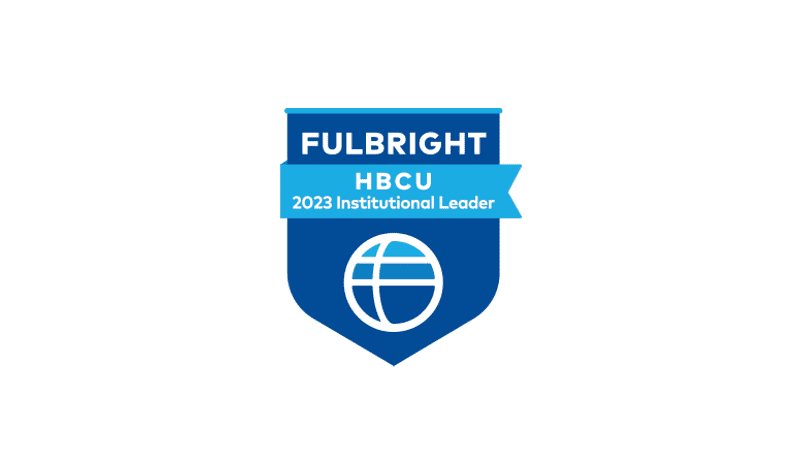U.S. Department of State Recognizes 19 Historically Black Colleges and Universities in 13 States and Washington, D.C. as Fulbright HBCU Institutional Leaders

As part of the Biden-Harris Administration’s commitment to supporting historically Black colleges and universities (HBCUs) in both policy and practice, the U.S. Department of State acknowledged 19 HBCUs as “Fulbright HBCU Institutional Leaders” in 13 states and Washington, DC, in recognition of their noteworthy engagement with the Fulbright Program during the 2022-23 academic year.
The Department established the Fulbright HBCU Institutional Leaders Initiative to recognize and commend the strong partnership between the Fulbright Program and HBCUs. The initiative encourages administrators, faculty, and students at HBCUs to engage with Fulbright, and highlights HBCUs as a destination for international students and scholars, showcasing their deep intellectual traditions and proud history to audiences abroad.
The 2023 Fulbright HBCU Institutional Leaders are:
- Alcorn State University – Claiborne County, MS
- Bennett College – Greensboro, NC
- Bluefield State University – Bluefield, WV
- Central State University – Wilberforce, OH
- Delaware State University – Wilmington, DE
- Fayetteville State University – Fayetteville, NC
- Florida A&M University – Tallahassee, FL
- Howard University – Washington, DC
- Jackson State University – Jackson, MS
- Jarvis Christian University – Wood County, TX
- The LeMoyne-Owen College – Memphis, TN
- Lincoln University – Chester County, PA
- Mississippi Valley State University – Leflore County, MS
- Morgan State University – Baltimore, MD
- North Carolina Central University – Durham, NC
- Spelman College – Atlanta, GA
- Texas Southern University – Houston, TX
- Tuskegee University – Tuskegee, AL
- Virginia State University – Ettrick, VA
“Diversity is one of America’s greatest strengths, and pairing the positive power of Fulbright with the academic excellence at historically Black colleges and universities provides changemaking opportunities for students, scholars, and campus communities both here at home and abroad,” said Lee Satterfield, the assistant secretary of state for educational and cultural Affairs.
The HBCU Institutional Leader status recognizes engagement with and promotion of the Fulbright Program. Recognized HBCUs host Fulbright Foreign Language Teaching Assistants and Fulbright Scholars-in-Residence, who teach in HBCU classrooms, and other international Fulbright Students and Scholars, and have U.S. students, faculty and staff carry out Fulbright awards to study, teach, or conduct research abroad.
On Nov. 6, the U.S. Department of State will host a virtual workshop featuring representatives from Fulbright HBCU Institutional Leaders to share best engagement practices to support students and faculty, increase the global footprint on campus through the Fulbright Program, host international Fulbright students and scholars, and build international networks. This event is open to the public and is specifically designed for faculty, staff and stakeholders at HBCUs.
The Fulbright Program is the U.S. government’s flagship international educational exchange program. Since its inception in 1946, the Fulbright Program has provided over 400,000 talented and accomplished students, scholars, teachers, artists and professionals of all backgrounds and in all fields, the opportunity to study, teach and conduct research abroad. Fulbrighters exchange ideas, build people-to-people connections, and work to address complex global challenges.
The Fulbright Program implements a wide range of initiatives to ensure that its participants reflect all aspects of the diversity of U.S. society and societies abroad. To achieve that goal, the program collaborates with external stakeholders, including the White House Initiative on HBCUs, the Hispanic Association of Colleges and Universities, the National Clearinghouse on Disability and Exchange, the American Association of Community Colleges, Mobility International, and Diversity Abroad, among many others.
The Fulbright Program is sponsored by the U.S. Department of State, Bureau of Educational and Cultural Affairs with funding provided by the U.S. government. The Institute of International Education administers components of the Fulbright Program.
Learn more about the Fulbright Program at https://fulbrightprogram.org, including information about Fulbright’s efforts to further DEIA within the program and about the Fulbright HBCU Institutional Leaders initiative.
Follow the Fulbright Program’s social media accounts and websites for highlights on HBCUs and Fulbright:
- Facebook: https://www.facebook.com/fulbright
- Twitter: https://twitter.com/FulbrightPrgrm
- Instagram: http://instagram.com/the_fulbright_program
- LinkedIn: https://www.linkedin.com/in/fulbright